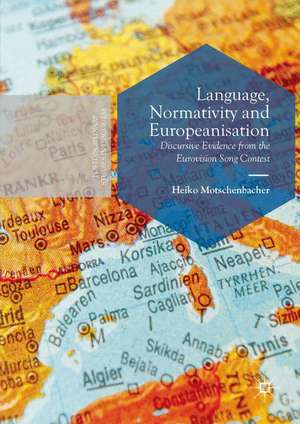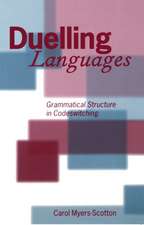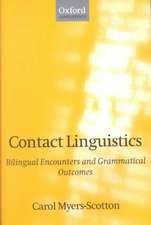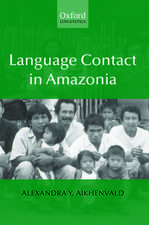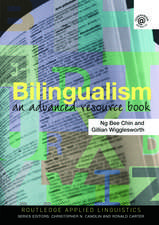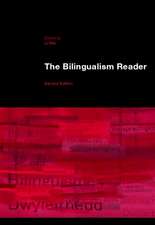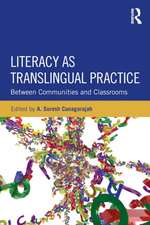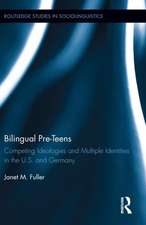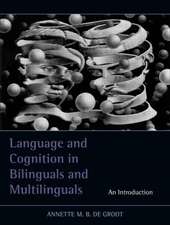Language, Normativity and Europeanisation: Discursive Evidence from the Eurovision Song Contest: Postdisciplinary Studies in Discourse
Autor Heiko Motschenbacheren Limba Engleză Hardback – 4 ian 2017
Din seria Postdisciplinary Studies in Discourse
- 18%
 Preț: 723.06 lei
Preț: 723.06 lei - 18%
 Preț: 726.37 lei
Preț: 726.37 lei -
 Preț: 484.85 lei
Preț: 484.85 lei - 18%
 Preț: 885.95 lei
Preț: 885.95 lei - 15%
 Preț: 694.87 lei
Preț: 694.87 lei - 15%
 Preț: 639.90 lei
Preț: 639.90 lei - 15%
 Preț: 643.34 lei
Preț: 643.34 lei -
 Preț: 385.62 lei
Preț: 385.62 lei -
 Preț: 210.55 lei
Preț: 210.55 lei - 18%
 Preț: 942.44 lei
Preț: 942.44 lei - 15%
 Preț: 648.56 lei
Preț: 648.56 lei -
 Preț: 447.41 lei
Preț: 447.41 lei - 18%
 Preț: 952.89 lei
Preț: 952.89 lei - 18%
 Preț: 724.17 lei
Preț: 724.17 lei - 15%
 Preț: 649.06 lei
Preț: 649.06 lei -
 Preț: 419.21 lei
Preț: 419.21 lei -
 Preț: 385.08 lei
Preț: 385.08 lei - 15%
 Preț: 698.80 lei
Preț: 698.80 lei - 18%
 Preț: 734.59 lei
Preț: 734.59 lei -
 Preț: 382.18 lei
Preț: 382.18 lei - 15%
 Preț: 691.59 lei
Preț: 691.59 lei - 18%
 Preț: 740.74 lei
Preț: 740.74 lei - 15%
 Preț: 699.28 lei
Preț: 699.28 lei - 15%
 Preț: 644.63 lei
Preț: 644.63 lei - 18%
 Preț: 1011.45 lei
Preț: 1011.45 lei - 18%
 Preț: 954.62 lei
Preț: 954.62 lei -
 Preț: 438.87 lei
Preț: 438.87 lei - 15%
 Preț: 642.68 lei
Preț: 642.68 lei -
 Preț: 318.82 lei
Preț: 318.82 lei -
 Preț: 222.84 lei
Preț: 222.84 lei
Preț: 590.95 lei
Preț vechi: 695.24 lei
-15% Nou
Puncte Express: 886
Preț estimativ în valută:
113.08€ • 118.38$ • 93.56£
113.08€ • 118.38$ • 93.56£
Carte tipărită la comandă
Livrare economică 05-19 aprilie
Preluare comenzi: 021 569.72.76
Specificații
ISBN-13: 9781137563002
ISBN-10: 1137563001
Pagini: 240
Ilustrații: XVII, 384 p. 6 illus. in color.
Dimensiuni: 148 x 210 x 30 mm
Greutate: 0.61 kg
Ediția:1st ed. 2016
Editura: Palgrave Macmillan UK
Colecția Palgrave Macmillan
Seria Postdisciplinary Studies in Discourse
Locul publicării:London, United Kingdom
ISBN-10: 1137563001
Pagini: 240
Ilustrații: XVII, 384 p. 6 illus. in color.
Dimensiuni: 148 x 210 x 30 mm
Greutate: 0.61 kg
Ediția:1st ed. 2016
Editura: Palgrave Macmillan UK
Colecția Palgrave Macmillan
Seria Postdisciplinary Studies in Discourse
Locul publicării:London, United Kingdom
Cuprins
Chapter 1: Introduction.- Chapter 2: The Communicative Setting of the Eurovision Song Contest (ESC).- Chapter 3: The Language-Identity-Normativity Interface and Critical Discourse Studies.- Chapter 4: Language Choice Practices in the ESC.- Chapter 5: Code-Switching Practices in ESC Performances.- Chapter 6: The Linguistic Construction of Europeanness, Nationalism and Sexuality in ESC Performances.- Chapter 7: Multimodal Identity Construction in ESC Performances.- Chapter 8: Prevalent Discourses in ESC Lyrics.- Chapter 9: Overview.
Recenzii
“This book is a notable addition to the field of sociolinguistics and critical discourse studies, one that I would recommend to anyone invested in gender or European scholarship.” (Vincent Pak, Language in Society, Vol. 49 (1), 2020)
Notă biografică
Heiko Motschenbacher is a lecturer at Goethe-University, Frankfurt am Main, Germany, where he completed his PhD and post-doc research. He has held temporary professorships of English Linguistics at universities in Bayreuth, Siegen, Braunschweig and Mainz. He is founder and co-editor of theJournal of Language and Sexuality (with William L. Leap). Among his recent publications are the monographs Language,Gender and Sexual Identity: Poststructuralist Perspectives(2010), An Interdisciplinary Bibliography on Language, Gender and Sexuality (2000–2011) (2012), and New Perspectives on English as a European Lingua Franca (2013). He has co-edited a special issue of the journal Discourse & Society on Queer Linguistic Approaches to Discourse (2013, with Martin Stegu) and the fourth volume of Gender Across Languages: The Linguistic Representation of Women and Men (2015, with Marlis Hellinger).
Textul de pe ultima copertă
This book focuses on linguistic practices of identity construction in a popular culture media context, the Eurovision Song Contest. Subscribing to a normativity-based approach to critical discourse analysis, it studies Europeanisation as it surfaces at the discursive interface of European, national and sexual identities in Eurovision lyrics and performances. Research in critical discourse analysis that deals with Europeanisation, or the discursive work involved in European identity formation, has so far mainly studied data from EU political contexts that illustrate a top-down approach to what Europeanness means. The present book complements this earlier research in several ways, focusing on the linguistic construction of identities, and its interrelation with non-linguistic modes of signification in the Eurovision Song Contest. Discursive mechanisms that prove to be central for the normative shifts of Europeanisation in the given context are de-essentialisation, inclusion, camp, crossing and languaging.
Heiko Motschenbacher is a lecturer at Goethe-University, Frankfurt am Main, Germany, where he completed his PhD and post-doc research. He has held temporary professorships of English Linguistics at universities in Bayreuth, Siegen, Braunschweig and Mainz. He is founder and co-editor of the Journal of Language and Sexuality (with William L. Leap). Among his recent publications are the monographs Language, Gender and Sexual Identity: Poststructuralist Perspectives (2010), An Interdisciplinary Bibliography on Language, Gender and Sexuality (2000–2011) (2012), and New Perspectives on English as a European Lingua Franca (2013). He has co-edited a special issue of the journal Discourse & Society on Queer Linguistic Approaches to Discourse (2013, with Martin Stegu) and the fourth volume of Gender Across Languages: The Linguistic Representation of Women and Men (2015, with Marlis Hellinger).
Caracteristici
Contextualizes the development of European identity by considering the linguistic practices of different European nationals at a major venue where popular cultures intersect Engages the gender and sexuality dimensions of the supra-national, European identity question Investigates identity formation via a bottom-up approach by looking at data based on individual performances of different speakers
